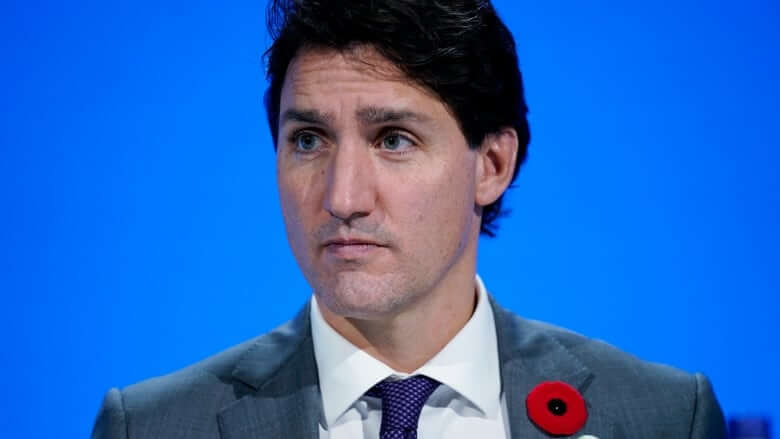Trudeau calls for global carbon tax at COP26 summit

Prime Minister Justin Trudeau urged all countries to agree to some sort of global price on carbon, a measure he says will dramatically curb the use of fossil fuels and level the playing field for countries like Canada that already impose a levy on emissions.
Speaking at a panel discussion organized by Canada on the sidelines of the COP26 summit in Glasgow, Scotland, Trudeau said his government fought hard to impose its carbon tax policy over the opposition of political opponents in Canada, and now he wants to take that fight to the global stage.
An international movement for some sort of “standard around putting a price on pollution” could make it more politically palatable in other countries where there’s also entrenched opposition to aggressive climate measures, Trudeau said.
If countries are forced to adopt a price, it could make it an easier sell to citizens concerned about the resulting higher cost of living.
“It’s always been hard to do this. We know citizens want more action on climate, but are always worried that they’re going to be the ones paying for the brunt of it,” Trudeau said.
Creating a global standard
The prime minister said Canada’s federal carbon tax regime — where a tax is levied on fuels like gas, light fuel oil for home heating, natural gas and propane, and most of the money is collected and rebated at tax time — could serve as a model for other countries contemplating more aggressive climate action through a pricing regime.
“One of the things we all know needs to come out of COP26 is a clearer call to create a global standard around putting a price on pollution. Not only will that encourage innovation, it will give that clear price signal to the private sector that making the right capital investments to transform to lower emissions makes sense. It also ensures that those who are leading on pricing pollution don’t get unfairly penalized,” Trudeau said.
The prime minister said fewer than 20 per cent of global emissions are currently covered by a carbon tax, and he wants to see that figure tripled by the end of this decade.
“We know it — leaders know it. Scientists know it and the private sector knows it: putting a price on pollution is the most efficient and powerful way to keep 1.5 alive,” he said, referring to the push to keep global temperature increases to 1.5 C to stave off the worst effects of climate change.
Decoupling growth from GHG emissions
Trudeau assembled a number of international heavy-hitters at the carbon tax panel discussion on Tuesday, including Kristalina Georgieva, the managing director of the International Monetary Fund; Ngozi Okonjo-Iweala, the director general of the World Trade Organization; and Ursula von der Leyen, the president of the European Commission.
Von der Leyen, the senior-most leader of the European Union, praised Canada’s leadership on the carbon tax file, saying it follows the EU’s emissions trading system, a cap-and-trade system that was first imposed on some industries on the continent in 2005. She also stood behind Trudeau’s call for some sort of carbon-pricing regime that applies to the global economy.
“It’s been proven — it helped us decouple growth from greenhouse gas emissions. So, you can prosper while cutting emissions,” she said, while touting the reductions seen across the power industry in Europe, where carbon emissions are down some 45 per cent since the trading system was first implemented.
“If we [lived] in a perfect world, I would love to have a global price on carbon for everybody and everything,” she said.
Environment Minister Steven Guilbeault said if the world doesn’t press ahead with some sort of standard carbon-pricing program, Canada would consider levying a border adjustment mechanism, which would impose taxes on products from countries that don’t have robust climate plans.
“If it’s the only thing we can do to ensure global emissions are being reduced, then we may have to do it,” he said, while adding his preference is for a global carbon tax, because it will be easier to implement.
A mix of competing border adjustment taxes would complicate global trade, Guilbeault conceded, but it may be necessary to send the signal to climate laggards that cost-free pollution will not be tolerated by Canada and like-minded countries.








Redes Sociais - Comentários